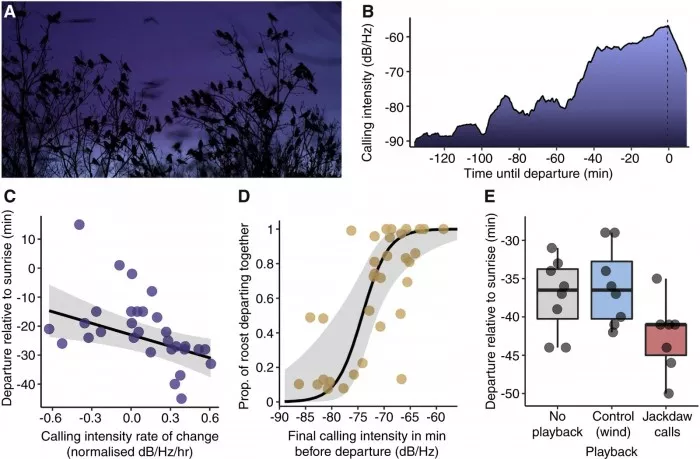Have you ever seen such a scene? At dusk, the birds suddenly fly to the high altitude in the sound, just like an invisible "hand" issuing a take-off command. Recently, a study published in contemporary biology showed that for hundreds of jackdaws who gather and inhabit, the increasing call may help the birds reach a "consensus" on when to take off**

"It's an amazing sight that the birds leave at the same time. The sky is suddenly full of blackbirds, like a black snowstorm." Alex Thornton of the University of Exeter in the UK said.
Jackdaws are close relatives of crows. They inhabit in clusters at night, and then divide into small groups to forage in different areas during the day.
Thornton and colleagues recorded hundreds of hours of video in six jackdaw habitats in Cornwall, UK, over a few months. The number of birds studied ranged from 160 to nearly 1500. They quantified the intensity of the birds' calls before, during and after flight, and then compared them with the takeoff video. The results showed that the intensity of jackdaw calls increased before takeoff.
To test whether there was a causal relationship between take-off and increased call intensity, the researchers replayed recordings of these strong calls and found that they could speed up the birds' take-off and departure by a few minutes, while recordings of other noises had no such effect.
Thornton said that this proves that jackdaws are actually signaling by sound that they are ready to leave. When the sound intensity reaches a certain threshold, it is considered that the whole group can leave collectively.
"At first, there were only sporadic calls, and then more and more birds joined in. The sound became stronger and stronger. The sooner they reached the threshold, the sooner they could leave." Thornton said.
The researchers also found that the intensity of the last call before takeoff was related to the cohesion of the flock at the time of departure. In most cases, the jackdaws took off early in the morning, and hundreds of birds flew into the air in about four seconds.
Thornton said that in rare cases, when the intensity of the call is not enough, the jackdaws seem unable to reach a consensus and can only leave in a scattered way.
The researchers believe that gathering together is good for jackdaws, such as reducing the risk of predation and transmitting information about the source of food to each other.
Related paper information: https://doi.com org/10.1016/j.cub. 2022.04.032
Author: Xu Rui source: China Science Daily